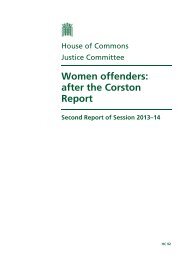Minority voices: Research into the access and acceptability of ... - MMC
Minority voices: Research into the access and acceptability of ... - MMC
Minority voices: Research into the access and acceptability of ... - MMC
- No tags were found...
You also want an ePaper? Increase the reach of your titles
YUMPU automatically turns print PDFs into web optimized ePapers that Google loves.
2b) BME young people at particular risk - refugees <strong>and</strong> asylum seekersGood practice example 14 -Save <strong>the</strong> Childrenyoung separatedrefugee projectThis started as a national research initiative,looking at <strong>the</strong> needs <strong>of</strong> young unaccompaniedminors, which described <strong>the</strong>ir needs for support.The young people were asked what <strong>the</strong>y wouldfind useful <strong>and</strong> highlighted that a safe place to goto for advice <strong>and</strong> information would be helpful.As a result <strong>of</strong> this finding, space was madeavailable for Save <strong>the</strong> Children to run a Saturdaydrop-in by <strong>the</strong> ‘City Centre Project’, a voluntarysector agency that supports young people whoare homeless or who have problems withsubstance misuse.When Save <strong>the</strong> Children drop-in first started, itattracted around 10-12 young people; however,word spread <strong>and</strong> <strong>the</strong> Saturday sessions becamevery popular with a regular attendance <strong>of</strong>between 30 <strong>and</strong> 50 young people. Issuesidentified at <strong>the</strong> drop-in were <strong>the</strong>n worked onby project staff during <strong>the</strong> week, with <strong>the</strong> nature<strong>of</strong> support being issue-led <strong>and</strong> individualised to<strong>the</strong> young person.The project also <strong>of</strong>fered <strong>the</strong> following:signposting/referring young people to o<strong>the</strong>rservices, including accompanying <strong>the</strong>m toappointments; one-to-one support; groupwork;outings <strong>and</strong> trips, residential weekends <strong>and</strong> asummer programme <strong>of</strong> activities. Outsideagencies/pr<strong>of</strong>essionals were also involved inrunning drop-in sessions.The initiative aimed to inform o<strong>the</strong>r agencies <strong>and</strong>pr<strong>of</strong>essionals about <strong>the</strong> needs <strong>of</strong> this group <strong>of</strong>young people <strong>and</strong>, where relevant, coordinate<strong>the</strong> support provided to clients. The Save <strong>the</strong>Children initiative has informed various o<strong>the</strong>rpilots <strong>and</strong> programmes <strong>of</strong> work around <strong>the</strong>country, ei<strong>the</strong>r through <strong>the</strong> research undertakenor <strong>the</strong> subsequent initiative developed toprovide direct support to clients.The provision <strong>of</strong> support in an environmentconsidered as a ‘safe place’ by <strong>the</strong> young peoplewas an important aspect.Good practice example 15 -Haven Project: working with young refugees<strong>and</strong> asylum seekers in <strong>the</strong> UKThe Haven Project was started in 1995 byAction for Children in Conflict (AfCiC), anorganisation that works to break cycles <strong>of</strong>violence, hatred <strong>and</strong> despair by providingpsychological, emotional <strong>and</strong> educational supportto <strong>the</strong> survivors <strong>of</strong> conflict. Haven provides aschool-based mental health service for asylumseeking/refugee children in schools in NorthLondon, Oxford, Cardiff, Glasgow, Leicester,Rochdale, Hull, Liverpool <strong>and</strong> Manchester. Thetarget age range is 5-18 years <strong>and</strong> in <strong>the</strong> future,<strong>the</strong> project will increasingly focus on workingwith unaccompanied minors.The main aims <strong>of</strong> <strong>the</strong> project are: To improve <strong>the</strong> <strong>access</strong>ibility <strong>of</strong> mental healthservices for asylum seeker/refugee families. The provision <strong>of</strong> mental health services forchildren in schools by experienced child <strong>and</strong>adolescent psychiatrists.Interpreters are available <strong>and</strong> <strong>the</strong>reis close consultation with families,with Haven <strong>of</strong>fering: Group, family <strong>and</strong> individual <strong>the</strong>rapies. The training <strong>of</strong> teachers to carry out initialassessments using st<strong>and</strong>ard instrumentswithin schools in partnership with specialeducational needs coordinators (SENCOs)<strong>and</strong> school-based <strong>the</strong>rapists.Manchester/Salford Haven ProjectThis was set up in November 2002 <strong>and</strong> wascommissioned <strong>and</strong> resourced by AfCiC inpartnership with <strong>the</strong> CAMHS Directorate <strong>of</strong>C<strong>MMC</strong> University Hospitals NHS Trust.Features <strong>of</strong> <strong>the</strong> service are: Work in schools - this is focused in two highschools, those with among <strong>the</strong> highest number<strong>of</strong> refugees <strong>and</strong> asylum seekers in each authority(Manchester <strong>and</strong> Salford) <strong>and</strong> takes <strong>the</strong> form <strong>of</strong>both consultation with staff <strong>and</strong> direct workwith young people <strong>and</strong> <strong>the</strong>ir families. Within<strong>the</strong>se schools target age groups are 11-16 years.Twenty-eight referrals were received in<strong>the</strong> first year. Consultation <strong>and</strong> liaison services – regularmultiagency consultation meetings attended byrepresentatives <strong>of</strong> Emotional Trauma SupportProject, Youth Access Team, EducationalPsychology Services; consultation toEMTAS (ethnic minority <strong>and</strong> travellersachievement service). Direct work - this takes place with youngpeople referred through o<strong>the</strong>r routes, forexample, GPs <strong>and</strong> EMTAS. Referrals from o<strong>the</strong>rsources are usually seen at <strong>the</strong> hospital baseswhere interpreters are more easily available. Training - workshops are delivered to staffworking with refugee <strong>and</strong> asylum seeking children<strong>and</strong> young people in a variety <strong>of</strong> settings, forexample, Social Services, City College, Save <strong>the</strong>Children, Diversity <strong>and</strong> Inclusion Team. Trainingpackages are also delivered on an ad hoc basis<strong>and</strong> address various issues.The project has a number <strong>of</strong> significant plans for<strong>the</strong> future including <strong>the</strong> extension <strong>of</strong> provision toprimary schools; <strong>the</strong> development <strong>of</strong> work with14-16 year olds who have not yet been allocatedschool places <strong>and</strong> 16-18 year olds attending CityCollege, <strong>and</strong> fur<strong>the</strong>r development <strong>of</strong>consultation/training services through trainingneeds analysis in relevant services, in order todevelop <strong>and</strong> deliver structured, training packages.Good practice example 16 -Refugee Therapy CentreBased in Islington, <strong>the</strong> Refugee Therapy Centreprovides psycho<strong>the</strong>rapy, counselling, help <strong>and</strong>support to children, young people <strong>and</strong> familieswho are refugees or asylum seekers.The service aims to give priority to those withless than ten years in <strong>the</strong> UK at <strong>the</strong> time <strong>of</strong> firstcontact. Referrals from pr<strong>of</strong>essional groups <strong>and</strong>self-referrals are accepted. Children, youngpeople <strong>and</strong> <strong>the</strong>ir families are a priority <strong>and</strong> areseen as quickly as possible. Numbers <strong>of</strong> referralsto <strong>the</strong> service show an upward trend <strong>and</strong> <strong>the</strong>service may be re-locating to larger premises in<strong>the</strong> near future.Individual, couple, family <strong>and</strong> group <strong>the</strong>rapy,based on an assessment <strong>of</strong> needs, are <strong>of</strong>fered bycounsellors, <strong>the</strong>rapists or support workers in avariety <strong>of</strong> languages (or if preferred, by anEnglish <strong>the</strong>rapist experienced in working withrefugees). A variety <strong>of</strong> clinical groups (child <strong>and</strong>adolescent psychiatrists, clinical psychologists,psychoanalysts, educational psychologists <strong>and</strong>psycho<strong>the</strong>rapists) provide advice <strong>and</strong> support on<strong>the</strong> clinical work undertaken by <strong>the</strong> Centre. By2002, a total <strong>of</strong> 87 psycho<strong>the</strong>rapists, counsellors<strong>and</strong> support workers had volunteered to workat <strong>the</strong> Centre. In addition, <strong>the</strong> Centre <strong>of</strong>ferstraining, supervision <strong>and</strong> consultation to o<strong>the</strong>rorganisations <strong>and</strong> pr<strong>of</strong>essionals workingwith refugees.A recent addition is an Outreach Project tosupport families at home <strong>and</strong> to assist in16
















